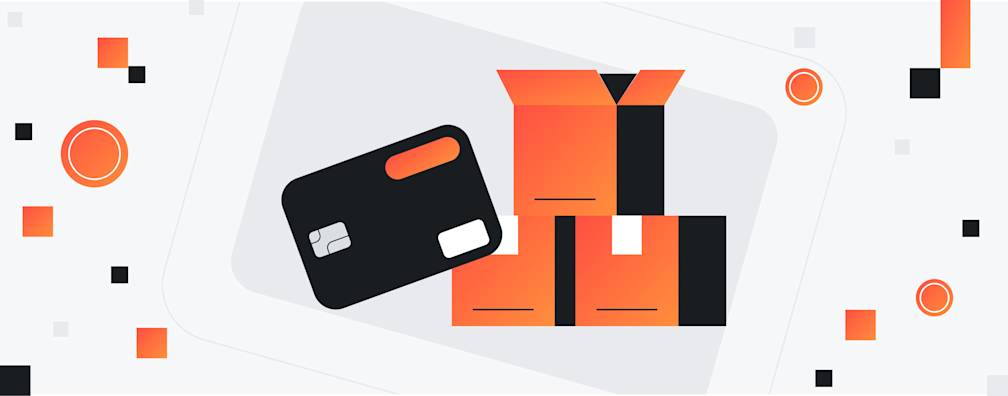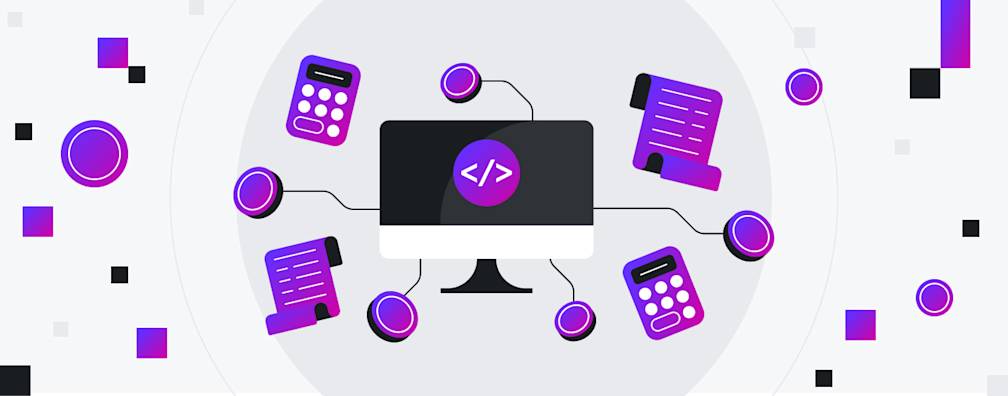Top 5 digital payment solutions and services in 2025

- •What is a digital payment solution?
- •Top digital payment solutions in 2025
- •Top features to look for in digital payment services
- •How do digital payment systems work?
- •What types of digital payments are there?
- •What questions to ask when onboarding a digital payment solution?
- •Why choose Airwallex as a digital payment provider?
- •FAQs about digital payment solutions
If you sell goods outside Singapore, you likely pay hefty fees for cross-border payments and currency conversions. Managing transactions in markets like China and the USA might also mean using various local bank accounts. This can make it difficult to secure the best exchange rates and get a unified view of your business’s performance.
With the right digital payment solution, you can take the hassle and confusion out of managing your global business. In this article, we’ll cover how you can benefit from these services, as well as 5 digital payment providers in Singapore that may be suited for your business.
What is a digital payment solution?
A digital payment solution is a financial technology (fintech) that lets businesses accept payments or transfer funds instantly.
Sometimes called digital banks or business accounts, these firms offer a comprehensive suite of financial services that facilitate international transfers, exchange currencies at interbank rates, and help you accept customer payments through bank cards and other cashless payment methods. Digital payment services also have a centralised dashboard for all your transactions, so you can manage your accounting and cash flow in one place.
These fintech services typically include the following features:
eCommerce payment gateway
Multi-currency accounts
Automated payment workflows
Expense management
Reporting and analytics
Integration with existing software
With so many providers available, it can be hard to know which suits your business needs best. In this article, we’re going to explore 5 of the most popular digital payment solutions with a focus on payment gateway capabilities to help you decide.
Top digital payment solutions in 2025
There are hundreds of fintech firms in Singapore that provide specialised digital payment solutions for businesses. For example, Wise and Airwallex are known for foreign exchange and global payments, while Aspire and YouBiz focus on payments via multi-currency debit cards. For this section, we’ll be focusing on 5 firms that support receiving eCommerce payments.
Airwallex is an end-to-end financial platform that helps businesses of all sizes streamline global payments and financial operations. Our comprehensive payment solutions include cross-border transfers, corporate cards, and more. Airwallex’s payment gateway solution helps you enter new markets faster by enabling payment acceptance from 180+ countries and 160+ local payment methods, such as AliPay in China. We’re also the only payment gateway in Singapore that offers like-for-like settlement in 11 currencies. When you get paid by customers in these 11 currencies, these are held in your Airwallex account without unnecessary conversion to SGD. This means you can accept payments from USA customers in USD, hold it in your Airwallex account, and use these funds to pay suppliers in USD. In the process, you eliminate unwanted conversion fees and maximise your profits. Airwallex’s payments platform integrates via no-code Payment Links and plugins for eCommerce platforms such as Shopify, WooCommerce, and Magento to fully customizable checkout experiences with native APIs, enabling teams to operate seamlessly across borders.
Adyen Singapore is a payments platform that allows businesses to accept payments online and in store. They have been operating in Singapore since 2015 and offer businesses a payment gateway and point-of-sale (POS) terminals. Adyen also has a solution for omnichannel sales, which means you can see your online and in-store payments in one platform.
PayPal is one of the oldest and most-recognised digital payment platforms. Unlike the other payment processing companies, PayPal offers digital wallets to consumers, allowing them to pay directly using their PayPal balance. Businesses can also use PayPal to process payments through credit cards, debit cards, and bank transfers.
Shopify Payments is the built-in payment service for Shopify merchants. They allow Shopify businesses to accept payments without the fees and complexity involved with integrating third party payment processing companies. However, Shopify for retail is not supported in markets like Malaysia or Indonesia.5 There is also limited support for local payment methods; in Singapore for example, third-party integrations with platforms like Airwallex are needed to support merchants with methods such as PayNow.6 Airwallex supports 160+ local payment methods worldwide.
Stripe Singapore is a payment processing service that lets businesses collect payments online and in-store. Like Adyen, Stripe offers a payment gateway and POS terminals. They also have custom analytics tools and an A/B testing feature that lets you test different payment methods on a subsection of your customers.
| Unique benefits | Global availability | Alternative payment methods | Third-party integrations |
|---|---|---|---|---|
Airwallex | All-in-one payments platform with like-for-like settlement in 11 currencies | 180+ countries | 160+ | eCommerce platforms like Shopify
Marketplaces like Shopee and Lazada
Accounting software like Xero
Productivity software like Zapier
Sales software like Hubspot |
PayPal | Digital wallet used by 300M individuals worldwide | 200+ countries | 81 | eCommerce platforms like Shopify
Marketplaces like Etsy
Accounting software like Quickbooks |
Shopify Payments | Default payment gateway for Shopify stores | 20+ countries | 62 | Accounting software like Xero |
Stripe | eCommerce and in-store payments | 40+ countries3 | 100+ | Accounting software like Xero
CRM like Salesforce
eCommerce platforms like WooCommerce
Affiliate networks
Productivity software like Kyber |
Adyen | Omnichannel payments solution with acquiring bank status | 190+ countries | 134 | eCommerce platforms like Shopify
Business management software like Netsuite
Cloud business platforms like Oracle |
Top features to look for in digital payment services
It can feel overwhelming when you start comparing digital payment providers. To help, we’ve compiled a list of the most important features to look out for:
Security: at the minimum, your provider should be PCI DSS compliant and have fraud prevention systems in place. For best-in-class, look for advanced encryption, SOC1, SOC2 and PSD2 compliance.
Cost: find a platform that’s right for you by asking about fee structure and the length of contract. Don’t forget about monthly subscription fees, foreign transaction fees and currency conversion costs.
Integration capabilities: it’ll make reconciliation, checkouts and forecasting easier and faster if your digital payment software integrates easily with your existing accounting and eCommerce platforms.
Global reach: look for a provider that helps you accept global payments without paying unnecessarily high FX or conversion fees, and offers local payment methods to your customers.
Scalability: look for a solution that can handle increased transaction volumes and multiple overseas markets without significant disruptions. This reduces the likelihood of you having to switch providers as you grow.
How do digital payment systems work?
Digital payment systems primarily facilitate smooth electronic transactions between buyers and sellers over the internet.
This financial software makes sure your customers’ money moves safely from their credit card or digital wallet to your bank account, without the need for physical cash or card readers.
The payment process typically includes the following steps:
Payment is initiated by the customer and financial details are entered on a website, mobile app or POS
This financial information is encrypted by the digital payment system and securely transmitted to the payment processor via a payment gateway provider.
The payment processor verifies the transaction details with the customer’s bank (issuing bank) and the merchant’s bank (acquiring bank)
The issuing bank authenticates and approves the transaction
Funds are settled and move from the customer’s bank to the merchant’s bank
It’s important to understand that digital payment software is an end-to-end solution, so it acts as both an online payment gateway and processor. You won’t need multiple suppliers to process your payments.
The capabilities of digital payment providers stretch far beyond transaction handling. Most offer a suite of features and support aimed at improving financial management, streamlining operations and fostering business global growth.
End-to-end digital payment platforms like Airwallex help you save hours of wasted time with automated supplier payments and expense management solutions. Say goodbye to manually chasing up invoices and reconciling accounts.
What types of digital payments are there?
These days, there are a lot of digital payment methods your customers can choose from. Offering a range of options helps boost your reputation and conversion rates and can result in you growing your global market share.
At an absolute minimum, you want to ensure your system accepts all major credit card brands, but best practice is to offer local payment methods.
Here’s a breakdown of the most popular payment methods digital payment companies offer:
Credit and debit cards. All businesses should offer card payments – they are still the most widely used payment method globally). Visa, MasterCard and American Express are the most popular.
Bank transfers. Direct bank transfers, including Automated Clearing House (ACH) in the US, SEPA transfers in Europe or Bacs payments in the UK, are usually favoured for B2B and larger transactions. Customers can transfer funds directly from their bank accounts to merchants without using a debit or credit card and incurring transaction fees.
Digital wallets. PayPal, Apple Pay and Google Pay allow users to store their payment information on mobile devices and pay for goods or services quickly and safely.
Invoice payments. This payment method involves a business sending an invoice to their customer, who makes the payment through traditional means. This can be automated for efficiency.
Buy Now, Pay Later (BNPL). Afterpay and Klarna offer customers the flexibility to purchase items and pay in instalments over time.
Preloaded cards and gift cards. Prepaid cards and gift cards from various retailers or services offer another flexible option for digital payments.
Instead of looking for a provider that offers as many of the above as possible, make a list of the most popular payment methods in your markets.
Talk to your support team and find out if there are any methods you don’t currently offer that your customers have requested. Then find a supplier that aligns with your needs.
By offering a diverse range of payment methods to your customers, you’ll make it easier for them to complete their purchases in a way that suits them.
What questions to ask when onboarding a digital payment solution?
Asking the right questions when selecting a new digital payment solution can make all the difference. You don’t want to end up with a platform you don’t like and waste time trying to exit a 12-month contract after a couple of months.
To help you make an informed decision, we’ve included a roundup of the key questions to ask your digital payment company when you’re in the onboarding phase:
Tell me about your security protocols. How does the provider ensure the safety and security of transactions? Investigate their KYC/AML procedures, encryption standards and fraud detection capabilities. They should at least meet PCI DSS industry standards.
Please explain your pricing structure. Ask about all potential fees, such as transaction, monthly, setup and conversion fees. This will help you avoid unexpected costs, particularly for international transactions.
Do you support global payments? Beyond understanding the cost of accepting international payments, does the provider allow you to collect and hold multiple currencies? Or will you be forced to convert all payments? This can get expensive, fast.
How many payment methods are available? Does the service support a variety of payment methods, including local and alternative options, as well as Visa, Mastercard and American Express credit and debit cards?
What integrations do you offer? Ensure the provider offers integrations with your existing accounting, CRM and eCommerce platforms to streamline your operations.
What kind of customer support available? Understand their customer service options, including response times and the availability of support channels like email, phone and chatbot.
Can you support quick business growth? It costs time and money to switch services every couple of years. Check your new provider can help you as you scale with increased transaction volumes and the ability to operate in multiple overseas markets without significant disruptions.
Tell me about your refunds and chargebacks policy. Ask how the digital payment system handles refunds and chargebacks – this can help protect your funds in the future.
Do you offer analytics? Reporting capabilities are valuable as they can help you forecast and reconcile your books quicker. Ask what kind of data insights are available with the platform and how detailed they are.
What is the customer experience like? Is the checkout functionality customisable? How does it integrate with your website/app and ensure a smooth transaction? This will help you understand how much the platform has considered user design.
Why choose Airwallex as a digital payment provider?
If you sell overseas or are planning to expand to new markets, Airwallex can help your business thrive. As a digital payment system, Airwallex lets you create seamless checkout experiences in 180+ countries and accept 180+ currencies using 160+ local payment methods. On top of this, you also get like-for-like settlement in USD, GBP, and 9 other leading currencies. This means you can accept and hold foreign currency payments in your Airwallex account without converting to SGD. These funds can later be used to pay suppliers in the same currency, which helps you avoid hefty conversion fees.
Airwallex also comes with an all-in-one Business Account to further streamline your financial operations. You get access to the following features at no extra cost:
Multi-currency Global Accounts. No need to create a bank account in markets where you operate. Airwallex’s Global Accounts let you bank like a local business in multiple countries and regions. It comes with a dedicated account number along with a local branch and bank code, so you can receive, hold, and spend foreign currency without unnecessary conversion.
Market-leading exchange rates. Airwallex gives you access to interbank exchange rates - the real exchange rates banks use to trade currency, minus the hefty markup. We charge only 0.4% - 0.6% above the interbank rate, and offer currency risk management features so you can lock in your preferred exchange rate.
Fast, low-cost international transfers. Airwallex lets you make international money transfers to 110+ countries as though it were a local payment. That’s because Airwallex works with local payment rails in economic territories like the EU, which allows overseas payment to bypass the SWIFT network. For you, this means low fees and clearing times as fast as 1 business day.
Borderless Cards. Issue unlimited virtual and physical virtual cards for free. These debit cards can be used wherever VISA is accepted,and help your employees pay for social media ads, business travel, and other expenses using the currencies in your Airwallex account. Misuse is easily prevented through real-time expense monitoring and custom controls.
Automated bill payments. Save time paying bills, employees, and suppliers. Send batch transfers for up to 1,000 recipients across countries, currencies, and transfer methods.
Build a thriving global business with Airwallex today! Create a free account now, or view case studies that show how Airwallex fueled the growth of local businesses like yours.
FAQs about digital payment solutions
1. What is a digital payment system?
A kind of software or digital tool that facilitates electronic payments and helps businesses manage their money.
2. What important factors to choose when selecting a digital payment solution?
There are lots of factors worth considering, including security and compliance, fees and costs, integration with business tools, scalability and growth potential, and which payment methods are supported.
3. How much does it cost to onboard a digital payment company?
Pricing varies between providers; some offer subscription plans, while others operate on a per-transaction model. Don’t forget there are often hidden fees for international payments.
4. How safe are digital payment services?
Secure digital payment services should include fraud prevention systems, end-to-end data encryption and be compliant with PCI DSS (the global security standard for organisations that store and process sensitive data).
Sources & references
1. https://developer.paypal.com/beta/apm-beta/
2. https://help.shopify.com/en/manual/payments/shopify-payments/supported-countries/singapore#accepting-payments
3. https://stripe.com/en-sg/payments
4. https://www.adyen.com/payment-methods?country=Singapore
***Note: This publication does not constitute legal, tax, or professional advice from Airwallex nor substitute seeking such advice, and makes no express or implied representations/warranties/guarantees regarding content accuracy, completeness, or currency.
Share

Shermaine spearheads the development and execution of content strategy for businesses in Singapore and the SEA region at Airwallex. Leveraging her extensive experience in eCommerce, digital payment solutions, business banking, and the cross-border industry, she provides invaluable insights that guide businesses through the complexities of global commerce. Specialising in crafting relevant and engaging content that resonates with business owners, her work is designed to drive growth and innovation within the fintech and business economy space.
View this article in another region:AustraliaHong Kong SAR - EnglishHong Kong SAR - 繁體中文United Kingdom

